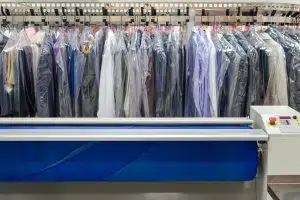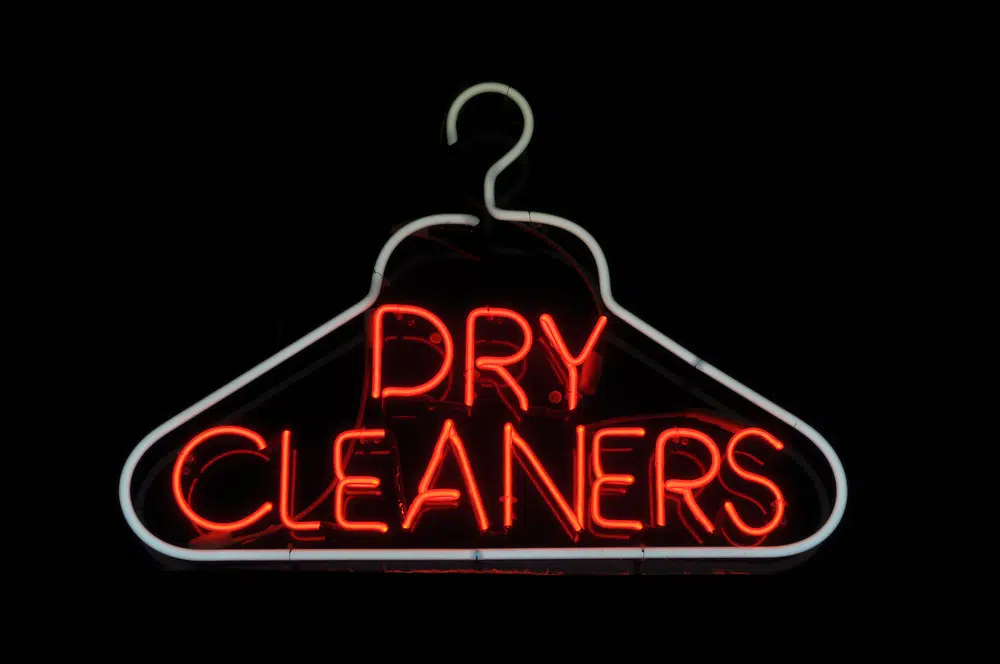 In the United Kingdom, the dry cleaning business is a highly competitive one. With so many businesses vying for customer attention, it can be difficult to stand out from the crowd. However, there are some steps that dry cleaners can take to make their businesses more successful. One of the most important things is to provide a high level of customer service.
In the United Kingdom, the dry cleaning business is a highly competitive one. With so many businesses vying for customer attention, it can be difficult to stand out from the crowd. However, there are some steps that dry cleaners can take to make their businesses more successful. One of the most important things is to provide a high level of customer service.
This means being polite and efficient, and making sure that clothes are returned on time and in good condition. Dry cleaners should also keep their premises clean and tidy, as this will create a good impression with customers. Finally, it is important to keep up with the latest trends in dry cleaning technology, as this can give businesses a real edge over their competitors. By following these simple tips, dry cleaners can give themselves the best possible chance of success in the UK market.
Businesses that provide dry cleaning services clean textiles that cannot be wet cleaned. To attract as many customers as possible, some outlets advertise themselves as ‘multi-service’ outlets. By reading through this guide, you will be able to understand how to start and run your own dry cleaners.
Research your target market
There is a good chance that you will have both retail and trade customers, so let’s talk a little bit about the both of them.
Retail customers
You will serve private individuals who need dry cleaning rather than wet laundering for their clothing and other textile items. A retail customer may typically require the cleaning and pressing of their work clothing on a regular basis, the cleaning of an outfit for an event or perhaps a specialist service, such as cleaning and packaging a wedding dress or dry cleaning curtains.
You may also be able to attract busy working people who have no time for ‘convenience’ services like ironing and service washing.
Try to match the services you offer to the needs of the people living and working in your area.
Trade customers
It is possible that some of your work will come from businesses that require dry cleaning and laundry services regularly, such as:
- Caterers, hotels, and restaurants
- A hairdressing salon, a beauty salon, a health spa, etc.
- Businesses that hire clothing, such as suits and fancy-dress rentals
- Businesses and organisations that provide their staff with dry-cleanable uniforms and workwear
Your business clients may also need other services, such as cabinet towel rentals and workwear rentals.
You might be able to find potential clients in your area if you make a list of them. The names and addresses of these companies can be found on Yell.com. It would then be possible to send them a mailshot or even visit them personally to advertise your services.
Local competition
It is important to determine how well other businesses serve your customers once you have determined who they might be. Within a six-mile radius of your outlet, how many dry cleaners are there? You can find out more about this by browsing Yell.com. Try to find out if any large specialist chains in your area are planning to open new branches, such as Johnsons (now part of the Timpson Group). In addition, you might be able to find a dry cleaning service in your local supermarket (this probably comes from a concession operated by a national chain).
Throughout the next few years, Timpson plans to open many new dry cleaning stores in supermarkets, increasing its share of the dry cleaning market. Dry cleaning businesses located elsewhere may use some local shops as receiving units. It is also done by some milkmen.
By looking at their advertisements and visiting their outlets, you can learn quite a bit about your competitors. Take note of their range of services and their prices. It may even inspire you to think about adding more services to your own business. Observe how their outlets look – are they clean and modern, or do they need to be updated? Are the staff friendly and helpful?
Keep an eye out for market gaps. A specialist service like antique textile cleaning and preservation might be in demand in your area, for example.
Decide which dry cleaning services you will offer
Dry cleaning
It may be possible for you to offer a range of specialty dry cleaning services in addition to general dry cleaning of everyday clothing. The range of equipment you have available and your own skills (or those of your staff) will determine this. You may offer the following dry cleaning services as part of your specialty business:
- Clothing made from suede, leather, and sheepskin, including motorcycle leathers
- Skiwear and waxed jackets
- Items of high value and antiques
- Dresses for brides
- Hats
- Silk items
- Soft toys
- Rugs, duvets, loose covers, curtains, and other household textiles
- Solvent free water based (aqueous) cleaning for dry-clean only textiles
- Dry cleaning using non-perchloroethylene solvents such as hydrocarbon, liquid silicone or the Solvon K4 organic solvent
Other textile services
Your retail customers may also be interested in other textile services. The following are examples:
- General laundry services
- Rental of carpet cleaning appliances
- Stonewashing
- Ironing and forming
- Repairs (including ‘invisible repairs’), alterations, and general tailoring
- Waterproofing and flameproofing
- Preservative packaging
Convenience services
In addition to textile and laundry services, you may offer other convenience services at your outlet. It is possible to do these tasks in-house or to hire a specialist to do them. The following services are available:
- Key cutting
- Shoe repairs
- Photo kiosk
- Film and image processing
- Engraving and sharpening
Services for other businesses
Offer your dry cleaning and laundry services to other businesses as a ‘one-stop’ package that meets all their textile needs. Some of these might be:
- Cabinet towel rental
- Workwear rental
- Linen hire
Added value services
It is competitive in the dry cleaning industry, so you may choose to offer ‘added value’ services to both retail and trade customers. Examples include:
- A collection and delivery service
- Online ordering
- A freephone telephone line
- A loyalty scheme
Price your dry-cleaning services
To cover all the services you offer, you will need to develop a price list. It is likely that you will set standard prices for cleaning different types of items, such as men’s suits, jackets, trousers, dresses, skirts, etc. The price of curtains is generally determined by the square meter (or sometimes by weight), and lined curtains will cost more. A loose cover’s price is usually determined by whether it’s for a chair, a two-seater sofa, or a three-seater sofa. Consider the following factors when setting your prices:
- The level of competition in the local market
- What your competitors charge for similar services
- Low prices will win your business away from your competitors
- If your prices are affordable for people in your area
If a garment is heavily soiled, for example, decide whether you will charge a higher rate.
Above all else, you need to ensure that your prices are high enough to cover all your expenses and still leave you with a profit.
You may be charged by the specialist who performs the service if you act as a ‘receiving unit’ for certain services (for example shoe repairs). You will need to decide how much other outlets will keep as their commission if they are going to serve as receiving units for your dry cleaning business.
Discounts and special offers
Discounts and incentives may be offered to your customers. A special discount might be included in your price list if two or more suits are ordered together. The following could also be offered:
- Discounts for pensioners and students – eye-catching promotions like Timpson’s free dry-cleaning for unemployed applicants attending job interviews can generate considerable publicity and goodwill
- Regular customers are rewarded with a loyalty program
- The occasional special offer, such as ‘two for the price of one’
Trade prices
You may be expected to offer a special trade rate if you provide dry cleaning services to other businesses on a regular basis. Your retail prices should be based on what your competitors are charging as well as what you need to earn to cover your costs.
If you plan to offer services like collection and delivery, think about whether they will be free. The cost and practicality of operating such a service should be considered.
Franchises
It may be beneficial to you to be affiliated with an established, well-known company when starting up a dry cleaning business. Franchising makes this possible.
Businesses in the textile and cleaning industries, including dry cleaners, can take advantage of several franchise opportunities. Key cutting and shoe repair are two other industries with franchise schemes.
A franchise can be large or small, national, regional, or local. The following key points are common to most schemes, despite differences in detail:
- As a franchisee, you will remain self-employed, but will use the franchisor’s identity (e.g., corporate colours, logos, trade name, etc.)
- The franchisor may charge you a one-time fee, a monthly fee, or a combination of both
Both you and your franchisor will likely have certain obligations; for example, the franchisor may give you an exclusive territory, and you may be required to maintain a certain standard.
In addition to training, many franchisors offer business and technical support to franchisees who need it.
Both you and your franchisor must sign the franchise agreement or contract, which details the above points. The franchise agreement will also cover other matters, such as the franchise’s minimum term.
Comparing the terms of different franchisors before signing an agreement is a good way to ensure you are getting the best deal. Before signing anything, talk to your lawyer about the contract.
Receiving unit
Your business can reach more potential customers if you set up a number of collection and drop-off points within the area you intend to serve – or ‘receiving units’. The cost is much lower than opening new locations, but you still reach customers who might not otherwise travel to your main location.
People can bring their dry cleaning items to a receiving unit for collection. Your employees or you will then visit all the receiving units on a regular basis (probably once a day or twice a week), picking up any items that need cleaning and dropping them off when they are done. Local dry cleaners can collect their equipment from shops like convenience stores.
You can also reach customers who would not be able to visit your outlet during regular working hours by using convenience stores as receiving units.
Your receiving units are normally paid either a percentage of your normal price or a fixed fee for dealing with your customers. Consider how much your competitors would pay for receiving units (if you can find out) as well as keeping enough profit for your own business. In addition, you might allow receiving units to add a profit margin to a special trade price.
A formal contract with your receiving units should be drafted containing your terms of trade. In addition to defining each party’s obligations, the contract should also specify payment terms and amounts.
You might be able to provide shoe repairs or other specialist services through your own business.
Promote your dry cleaning business
The best way to reach your potential customers is to effectively promote your business.
Walking or driving past your shop will expose some of your customers to your shop. It may be impossible for others to find a dry cleaner in their area, so they will have to search for one.
Telephone and online directories
Advertise your business on Yell.com or some other online equivalents. Most of your competitors will have done the same thing, for sure.
Large, eye-catching display advertisements are a common marketing strategy for some companies. It will be up to you to decide whether you want to compete directly with these companies or try to find a different way of attracting customers. For example, you might:
- In your advertising materials, emphasise your unique selling point (USP). Typical examples include “Family-run business”, “Free delivery and collection” and “Fast turnaround”.
- In addition, you can advertise in other ways. In a mailshot, you could distribute a paper flyer or sticker with your business name and telephone number on it. Perhaps you could leave some flyers on the counter of some local clothes shops
Other ways of advertising
Your business can be advertised and promoted in other ways. Here are a few examples:
- Become a member of a trade association. There are many trade associations that maintain a directory of members, and some promote the services of their members quite extensively
- Become a member of local business groups and networking societies. By joining a local Chamber of Commerce, for example, you can connect with other businesspeople in your area who might need laundry services on a regular basis
- Getting in touch with people who regularly decide to outsource their laundry. A hotel manager, a restaurateur, a salon owner, etc., might fall into this category.
- A website can be launched. Local services can be found online more and more, so a website could be beneficial. Providing a collection service could even allow you to offer online ordering. Start your own blog and use social networking sites like Facebook and Twitter as cheaper alternatives to creating your own website
- Newspaper advertising
- Your advertisements should emphasise as many of the positive aspects of your business as possible, especially those that set it apart from the competition
It is important to keep your business vehicle clean and presentable if you intend to use it for advertising.
Word of mouth
Your business benefits from word-of-mouth recommendations. Providing good, reliable service is the key to earning your reputation – but even small things like friendliness and helpfulness can pay off. Ensure that your employees are good ambassadors for your company as well.
Buy an existing dry cleaning business
The alternative to starting your own dry cleaning business might be to buy an existing one.
Make sure that you negotiate a fair price with the seller of any business you are interested in. You should try to determine why the business is for sale – for example, is the owner looking to retire or is there another personal reason for the sale.
It will be possible for you to determine if the owner is selling since he or she is unable to generate enough income from the business by researching the sector as a whole and the locality. You may not be discouraged by this – many businesspeople are confident that they can turn a failing company around. In order for the price you pay for the business to be reasonable, it is important to have established the business’ current position.
Discuss with your accountant the selling price considering the business accounts for the past three years. Include legal fees, valuation costs, business finance loan and survey costs in your budget.
The laundry and dry cleaning industry is served by several business sales agencies. Finance, training, and legal advice may be available from these organisations.
Jarred Musson is a versatile writer with a diverse educational background and a passion for all things business. Holding a Master of Science (MSc) degree in Marketing and a Bachelor of Arts (BA Hons) in Multimedia Journalism from Manchester Metropolitan University, Jarred possesses a unique blend of expertise that allows him to dissect and communicate complex business topics with clarity and precision.


